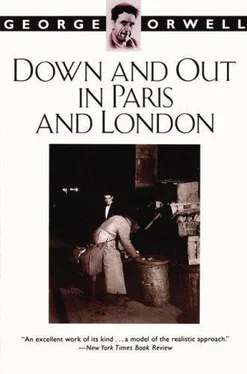George Orwell - Down and Out in Paris and London
Здесь есть возможность читать онлайн «George Orwell - Down and Out in Paris and London» весь текст электронной книги совершенно бесплатно (целиком полную версию без сокращений). В некоторых случаях можно слушать аудио, скачать через торрент в формате fb2 и присутствует краткое содержание. Жанр: Старинная литература, на русском языке. Описание произведения, (предисловие) а так же отзывы посетителей доступны на портале библиотеки ЛибКат.
- Название:Down and Out in Paris and London
- Автор:
- Жанр:
- Год:неизвестен
- ISBN:нет данных
- Рейтинг книги:5 / 5. Голосов: 1
-
Избранное:Добавить в избранное
- Отзывы:
-
Ваша оценка:
- 100
- 1
- 2
- 3
- 4
- 5
Down and Out in Paris and London: краткое содержание, описание и аннотация
Предлагаем к чтению аннотацию, описание, краткое содержание или предисловие (зависит от того, что написал сам автор книги «Down and Out in Paris and London»). Если вы не нашли необходимую информацию о книге — напишите в комментариях, мы постараемся отыскать её.
Down and Out in Paris and London — читать онлайн бесплатно полную книгу (весь текст) целиком
Ниже представлен текст книги, разбитый по страницам. Система сохранения места последней прочитанной страницы, позволяет с удобством читать онлайн бесплатно книгу «Down and Out in Paris and London», без необходимости каждый раз заново искать на чём Вы остановились. Поставьте закладку, и сможете в любой момент перейти на страницу, на которой закончили чтение.
Интервал:
Закладка:
the food that remained. The wastage was astonishing and,
in the circumstances, appalling. Half-eaten joints of meat,
and bucketfuls of broken bread and vegetables, were
pitched away like so much rubbish and then defiled with
tea-leaves. I filled five dustbins to overflowing with quite
eatable food. And while I did so fifty tramps were sitting
in the spike with their bellies half filled by the spike
dinner of bread and cheese, and perhaps two cold boiled
potatoes each in honour of Sunday. According to the
paupers, the food was thrown away from deliberate policy,
rather than that it should be given to the tramps.
At three I went back to the spike. The tramps had
been sitting there since eight, with hardly room to move
an elbow, and they were now half mad with boredom.
Even smoking was at an end, for a tramp's tobacco is
picked-up cigarette ends, and he starves if he is more
than a few hours away from the pavement. Most of the
men were too bored even to talk; they just sat packed on
the benches, staring at nothing, their scrubby faces split
in two by enormous yawns. The room stank of
ennui .
Paddy, his backside aching from the hard bench, was
in a whimpering mood, and to pass the time away I
talked with a rather superior tramp, a young carpenter
who wore a collar and tie and was on the
road, he said, for lack of a set of tools. He kept a little
aloof from the other tramps, and held himself more like a
free man than a casual. He had literary tastes, too, and
carried a copy of
Quentin Durward in his pocket. He told
me that he never went into a spike unless driven there by
hunger, sleeping under hedges and behind ricks in
preference. Along the south coast he had begged by day
and slept in bathing-huts for weeks at a time.
We talked of life on the road. He criticised the
system that makes a tramp spend fourteen hours a day
in the spike, and the other ten in walking and dodging
the police. He spoke of his own case-six months at the
public charge for want of a few pounds' worth of tools.
It was idiotic, he said.
Then I told him about the wastage of food in the
workhouse kitchen, and what I thought of it. And at that
he changed his tone instantly. I saw that I had awakened
the pew-renter who sleeps in every English workman.
Though he had been famished along with the others, he
at once saw reasons why the food should have been
thrown away rather than given to the tramps. He
admonished me quite severely.
"They have to do it," he said. "If they made these
places too comfortable, you'd have all the scum of the
country flocking into them. It's only the bad food as
keeps all that scum away. These here tramps are too
lazy to work, that's all that's wrong with them. You
don't want to go encouraging of them. They're scum."
I produced, arguments to prove him wrong, but he
would not listen. He kept repeating:
"You don't want to have any pity on these here
tramps-scum, they are. You don't want to judge them
by the same standards as men like you and me. They're
scum, just Scum."
It was interesting to see the subtle way in which he
disassociated himself from "these here tramps." He had
been on the road six months, but in the sight of God, he
seemed to imply, he was not a tramp. I imagine there are
quite a lot of tramps who thank God they are not tramps.
They are like the trippers who say such cutting things
about trippers.
Three hours dragged by. At six supper arrived, and
turned out to be quite uneatable; the bread, tough enough
in the morning (it had been cut into slices on Saturday
night), was now as hard as ship's biscuit. Luckily it was
spread with dripping, and we scraped the dripping off and
ate that alone, which was better than nothing. At a quarter-
past six we were sent to bed. New tramps were arriving,
and in order not to mix the tramps of different days (for
fear of infectious diseases) the new men were put in the
cells and we in dormitories. Our dormitory was a barn-like
room with thirty beds close together, and a tub to serve as
a common chamber-pot. It stank abominably, and the
older men coughed and got up all night. But being so
many together kept the room warm, and we had some
sleep.
We dispersed at ten in the morning, after a fresh
medical inspection, with a hunk of bread and cheese for
our midday dinner. William and Fred, strong in the
possession of a shilling, impaled their bread on the spike
railings-as a protest, they said. This was the second spike
in Kent that they had made too hot to hold them, and
they thought it a great joke. They were cheerful souls,
for tramps. The imbecile (there is an imbecile in every
collection of tramps) said that he was too tired to walk
and clung to the railings, until the Tramp Major had to
dislodge him and start him with a kick, Paddy and I
turned north, for London.
Most of the others were going on to Ide Hill, said to be
about the worst spike in England.'
Once again it was jolly autumn weather, and the road
was quiet, with few cars passing. The air was like sweet-
briar after the spike's mingled stenches of sweat, soap
and drains. We two seemed the only tramps on the road.
Then I heard a hurried step behind us, and someone
calling. It was little Scotty, the Glasgow tramp, who had
run after us panting. He produced a rusty tin from his
'pocket. He wore a friendly smile, like someone repaying
an obligation.
"Here y'are, mate," he said cordially. "I owe you some
fag ends. You stood me a smoke yesterday. The Tramp
Major give me back my box of fag ends when we come
out this morning. One good turn deserves another-here
y'are."
And he put four sodden, debauched, loathly cigarette
ends into my hand.
XXXVI
I WANT to set down some general remarks about
tramps. When one comes to think of it, tramps are a
queer product and worth thinking over. It is queer that a
tribe of men, tens of thousands in number, should be
marching up and down England like so many Wandering
Jews. But though the case obviously wants considering,
one cannot even start to consider it until one has got rid
of certain prejudices. These prejudices are rooted in the
idea that every tramp,
ipso facto , is a blackguard. In
childhood we have been taught that tramps are
blackguards, and consequently there exists in our minds a
sort of ideal or typical tramp -a repulsive, rather
dangerous creature, who would
1 I have been in it since, and it is not so bad.
die rather than work or wash, and wants nothing but to
beg, drink and rob hen-houses. This tramp-monster is
no truer to life than the sinister Chinaman of the
magazine stories, but he is very hard to get rid of. The
very word "tramp" evokes his image. And the belief in
him obscures the real questions of vagrancy.
To take a fundamental question about vagrancy: Why do
tramps exist at all? It is a curious thing, but very few
people know what makes a tramp take to the road. And,
because of the belief in the tramp-monster, the most
fantastic reasons are suggested. It is said, for instance,
that tramps tramp to avoid work, to beg more easily, to
seek opportunities for crime, even-least probable of
reasons-because they like tramping. I have even read in a
book of criminology that the tramp is an atavism, a
Читать дальшеИнтервал:
Закладка:
Похожие книги на «Down and Out in Paris and London»
Представляем Вашему вниманию похожие книги на «Down and Out in Paris and London» списком для выбора. Мы отобрали схожую по названию и смыслу литературу в надежде предоставить читателям больше вариантов отыскать новые, интересные, ещё непрочитанные произведения.
Обсуждение, отзывы о книге «Down and Out in Paris and London» и просто собственные мнения читателей. Оставьте ваши комментарии, напишите, что Вы думаете о произведении, его смысле или главных героях. Укажите что конкретно понравилось, а что нет, и почему Вы так считаете.












